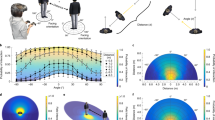Abstract
This paper presents a model to generate and animate groups which emerge as a function of interaction among virtual agents. The agents are characterized through the following parameters: sociability, communication, comfort, perception and memory. The emergent groups are characterized through the cohesion parameter which describes the homogeneity of ideas of the group members. In this work we are mainly interested in investigating the formation of groups (membership and time for grouping), the groups characterization (cohesion parameter) and their visual representation (group formation). The overall results suggest that the interaction among agents contributes to larger groups and higher crowd cohesion values.
Preview
Unable to display preview. Download preview PDF.
Similar content being viewed by others
References
Age of mitology (2003), http://www.ensemblestudios.com/aom/
Allbeck, J., Badler, N., Bindiganavale, R.: Describing human and group movements for interactive use by reactive virtual characters. In: Army Science Conference (2002)
Barros, L.M., Evers, T., Musse, S.R.: A framework to investigate behavioral models. Journal of WSCG, 40–47 (2002)
Belnesch, H.: Atlas de la Psychologie, Encyclopdies d’Aujourd’hui (1995)
Braun, A., Musse, S.R., Oliveira, L.P.L., Bodman, B.E.J.: Modeling Individual Behaviors in Crowd Simulation. In: Computer Animation and Social Agents, pp. 143–148 (2003)
Command and conquer generals (2003), http://www.westwood.com
Lewin, K.: Field Theory and Experiment in Social Psychology: concepts and methods (1939)
Mataric, M. J.: Learning to behave socially. In: From Animals to Animats: International Conference on Simulation of Adaptative Behavior, pp. 453–462 (1994)
Musse, S.R., Thalmann, D.: Hierarquical model for real time simulation of virtual human crowds. IEEE Transactions on Visualization and Computer Graphics 7, 152–164 (2001)
Reynolds, C.W.: Flocks, herds, and schools: A distributed behavioral model. Computer Graphics 21(4), 25–34 (1987)
Terzopoulos, D.: Artificial life for computer graphics. Communications of the ACM 42, 33–42 (1999)
Tu, X., Terzopoulos, D.: Artificial fishes: Physics, locomotion, perception, behavior. Computer Animation, 43–50 (1994)
Author information
Authors and Affiliations
Editor information
Editors and Affiliations
Rights and permissions
Copyright information
© 2003 Springer-Verlag Berlin Heidelberg
About this paper
Cite this paper
Becker Villamil, M., Raupp Musse, S., Luna de Oliveira, L.P. (2003). A Model for Generating and Animating Groups of Virtual Agents. In: Rist, T., Aylett, R.S., Ballin, D., Rickel, J. (eds) Intelligent Virtual Agents. IVA 2003. Lecture Notes in Computer Science(), vol 2792. Springer, Berlin, Heidelberg. https://doi.org/10.1007/978-3-540-39396-2_26
Download citation
DOI: https://doi.org/10.1007/978-3-540-39396-2_26
Publisher Name: Springer, Berlin, Heidelberg
Print ISBN: 978-3-540-20003-1
Online ISBN: 978-3-540-39396-2
eBook Packages: Springer Book Archive




